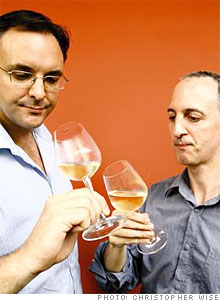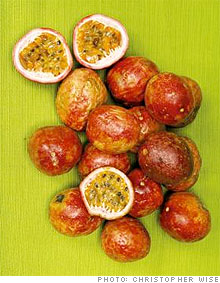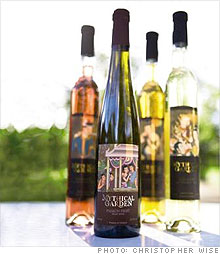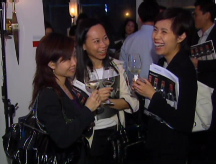A vintner's vision: Wine from mangosteens
A cosmopolitan vintner gambles that Thai fruit wine will please U.S. palates.
 |
| Dominic Rivard (at left) and Germain Bergeron sample their Mythical Garden wine. |
 |
| Passion fruits (pictured), mangosteen and lychee are used for Rivard's wines. |
 |
| Rivard is working with a Sacramento business to bring his Mythical Garden wines to the U.S. |
(Fortune Small Business) -- Looking back, Dominic Rivard has to admit that starting a business in Thailand within weeks of a military coup might not have been the best idea.
It took more than six months to find an investor willing to take a risk on his proposal to build an exotic fruit winery in Southeast Asia. And then, with the government's ministries in some confusion, it took twice as long as expected to register the company.
"Maybe it was stupid," says Rivard, but Thailand, with its abundant fruit harvests to supply the winery and its millions of tourists to buy the wines, seemed an ideal location. Two years later, Apsara Valley Wines, located 30 miles north of Bangkok, is distributing its first batch of pineapple, passion-fruit, mangosteen and lychee wines to high-end restaurants and resorts in the area. Rivard's next goal: to bring these libations to the U.S. market.
A 36-year-old Canadian who has served as head winemaker for more than 10 producers in Canada and China, Rivard has spent most of his life in the business. At age 17 he made his first batch of wine from dandelions and concord grapes in his backyard. Later he took sommelier classes. After a brief stint working in a wine laboratory, he launched his own business as an enological consultant, advising companies on both sides of the Pacific.
In 2002 Rivard was offered a joint venture with a provincial agriculture ministry in China, which gave him a minority stake in the firm and second billing in the company, Tianjin Kernel Rivard Wines. Two years later the business was struggling. Investment in equipment had been heavy, but Rivard believed that essential marketing efforts had been underfinanced.
"We had a very good product," says Arvin Tian, Rivard's business partner at the time, "but the company wasn't managed well."
Rivard concurs. "By the end I felt like a puppet," he recalls. "I was nothing more than the white figurehead."
But Rivard had a family to support. So when the business failed, he signed on as head winemaker at one of China's largest wineries, Tonghua Grape Wine. After a couple of years he felt restless again. A friend introduced him to Germain Bergeron, a fellow Canadian and serial entrepreneur who was based in Thailand. Bergeron, 40, needed a new venture, and Rivard wanted an ambitious partner. In 2006 Rivard moved to Bangkok to work with Bergeron, founding Hong Kong-based Oeno Wines, an importer and the parent of Apsara Valley.
Rivard says he's learned from his mistakes. This time, he and Bergeron own a controlling interest in the company. They've invested less in production equipment and more in product packaging, a key component in Asia, where wine is often bought as a gift. Rivard has also grown used to the cultural nuances of doing business in the region.
That knowledge proved useful in a recent deal. A large South Korean importer hired Rivard and Bergeron to make a Malvasia grape wine in Italy. After they spent tens of thousands of dollars on production and packaging, and with a container loaded and ready to ship, the importer decided to cancel the order. The reason: a vague complaint about packaging that had been approved months earlier.
"It was very frustrating," says Rivard. "A North American mind-set would have gotten mad and called in the lawyers, because there were contracts involved."
Instead, he flew to the importer's headquarters to renegotiate. It took nearly three months of visits and dinners to get the deal back on track, but Rivard felt it was worth it: "We built stronger relationships with the buyer and solidified future deals."
In its first four months of sales, Apsara Valley has generated more than $90,000 from its dry and dessert fruit wines. By next year, Rivard and Bergeron hope to top $500,000. That will partly depend on their ability to tackle the U.S. market. They plan to partner with Makiko Yamashita, a Sacramento entrepreneur who will sell the fruit wine under her own brand, Radee. But marketing a largely unknown beverage - and one that sounds unsophisticated to boot - at a premium price may not be easy. Sales of fruit wine in the U.S. grew by less than 8% from 2002 to 2007, according to the research firm Euromonitor International.
"The market is tiny, and it's hard to get money commensurate with the work you put in," says Bill Nelson, president of WineAmerica, a trade group whose members include fruit wineries. "Most companies aren't able to sell fruit wine for more than $10 a bottle."
Nonetheless, Apsara Valley's owners continue to feel bullish about the U.S. market. Says Rivard: "We just need the wine-drinking world to open up." ![]()
-
The Cheesecake Factory created smaller portions to survive the downturn. Play
-
A breeder of award-winning marijuana seeds is following the money and heading to the U.S. More
-
Most small businesses die within five years, but Amish businesses have a survival rate north of 90%. More
-
The 10 most popular franchise brands over the past decade -- and their failure rates. More
-
These firms are the last left in America making iconic products now in their twilight. More









